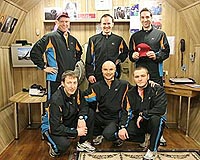 |
Houston TX (SPX) Jul 15, 2009 From March 31 to July 14, a six-man international crew called an isolation chamber in Moscow their home. The crew, composed of four Russians and two Europeans, simulated a 105-day Mars mission full of experiments and realistic mission scenarios, including emergency situations and 20-minute communications delays. U.S. participation in the mission consisted of three research teams with experiments evaluating solutions to conditions that impact work performance. The projects evaluated lighting interventions to counter sleep disruption due to shift work or long hours, tested two objective methods of measuring the impact of stress and fatigue on performance, and assessed interactions between crew members and mission control. The three projects were funded by the Houston-based National Space Biomedical Research Institute (NSBRI). "The mission allowed us to look at the feasibility of certain technologies developed for improving performance by deploying them in an extremely demanding work environment. In this realistic setting, will crews use the technologies and will we get good data?" said Dr. David F. Dinges, leader of the NSBRI group funded from University of Pennsylvania School of Medicine and Rutgers. "Additional goals were to see how different mission situations affected the various performance measures and to evaluate whether the interventions could indeed improve performance." The 105-Day Mars Mission, a partnership between the Russia's Institute of Biomedical Problems and the European Space Agency, is the precursor to a 520-Day mission scheduled for 2010. The isolation facility consists of several interconnected, modules containing medical and scientific research areas, living quarters, a kitchen, greenhouse and exercise facility. For researchers, the opportunity to run experiments in this type of environment was invaluable. "We've done experiments in the sleep lab to test the efficacy of lighting interventions, but that is a highly controlled environment," said Dr. Charles A. Czeisler, leader of the NSBRI project funded from Harvard Medical School, Brigham and Women's Hospital, and University of Colorado. "By transitioning studies into an operational environment, like the 105-Day Mission, we have the opportunity to learn how to best deploy interventions in a realistic mission setting. This analog is a great intermediate step before implementation on an actual spaceflight." Participation from the crew and mission controllers was excellent. All three NSBRI projects received data throughout the mission. Final data will be received in the coming weeks, and the teams will begin detailed data analysis. "These tests and interventions have an impact beyond the space program," Dinges said. "Many people work night shifts and in high-stress, confined environments that require alertness, such as power plant control rooms, railroad systems, hospitals, military operations, and fire and rescue situations. The things that we are learning here about how to enhance performance will be useful in many work environments." Share This Article With Planet Earth
Related Links National Space Biomedical Research Institute (NSBRI) Mars News and Information at MarsDaily.com Lunar Dreams and more
 Mars500 Crew Safely 'Landed'
Mars500 Crew Safely 'Landed'Bonn, Germany (SPX) Jul 15, 2009 The 105-day space travel simulation experiment 'Mars 500', based in Moscow with German involvement, has just finished. On 14 July 2009, the crew, including Oliver Knickel, a member of the German Army, left the module system at the Institute for Biomedical Problems (IBMP) at the Russian Academy of Sciences. The six people taking part in the experiment will be subjected to a rigorous series ... read more |
|
| The content herein, unless otherwise known to be public domain, are Copyright 1995-2009 - SpaceDaily. AFP and UPI Wire Stories are copyright Agence France-Presse and United Press International. ESA Portal Reports are copyright European Space Agency. All NASA sourced material is public domain. Additional copyrights may apply in whole or part to other bona fide parties. Advertising does not imply endorsement,agreement or approval of any opinions, statements or information provided by SpaceDaily on any Web page published or hosted by SpaceDaily. Privacy Statement |